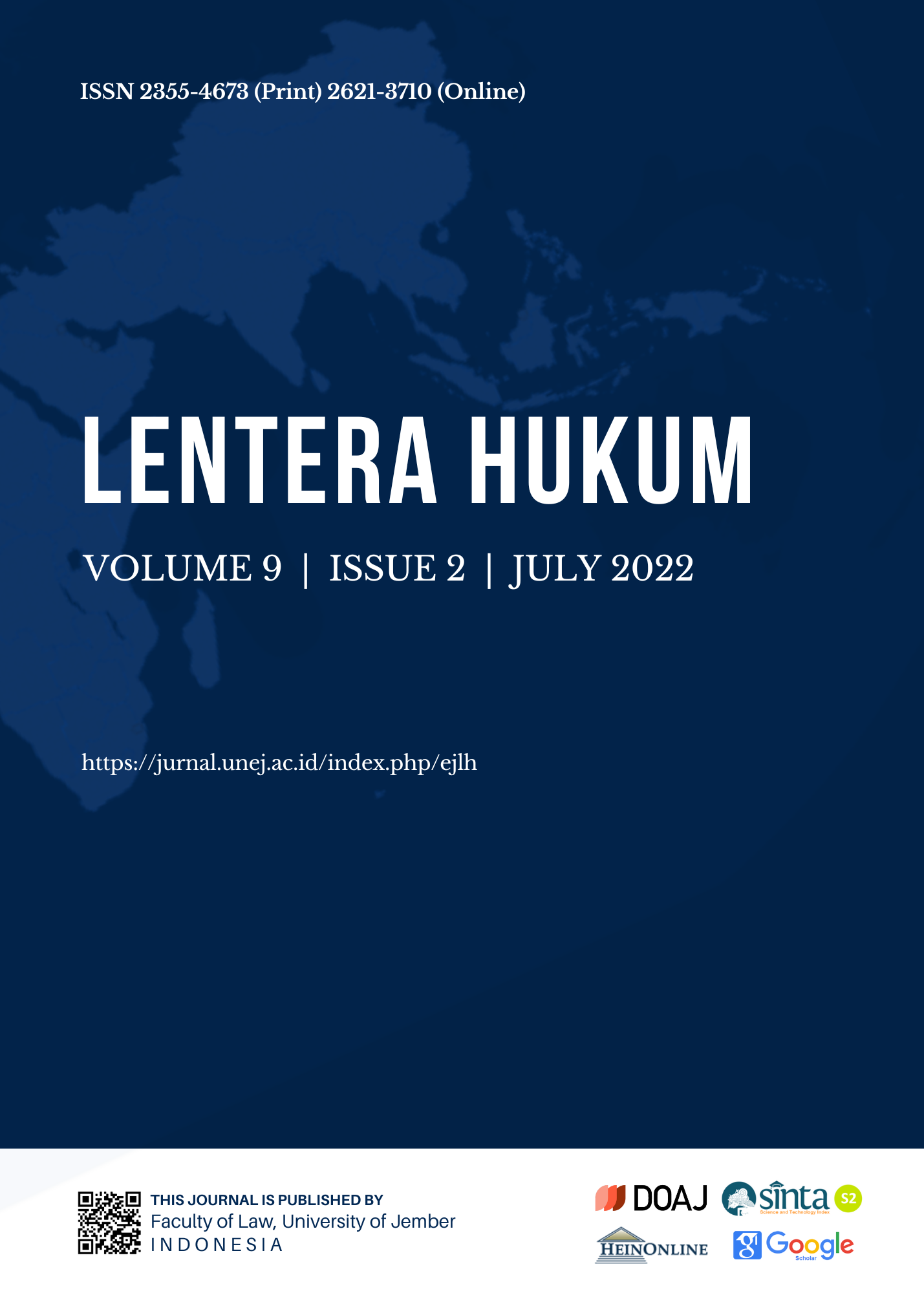Political Question Doctrine and Judicial Attitude to Political Controversies in Nigeria
Implications for Constitutionalism
DOI:
https://doi.org/10.19184/ejlh.v9i2.30185Abstract
The political question doctrine has become one of the jurisprudential issues in a constitutional democracy, as the courts may not want to exercise judicial review to determine the constitutionality of the action of the other organs of government or a statute before it. As a legal instrument, judicial review has been used to expand or reduce the powers of the governments, but the courts decide to exercise this power discretionarily on the ground that it falls within the province of politics. This study aimed to analyze 'political question' and judicial attitude to political controversies in Nigeria by unraveling how the doctrine of political question has been applied in three main areas–impeachment proceedings, political parties' primary elections, and post-election matters. It also analyzed the judiciary's attitudes to political controversies and evaluated the implications of the political question doctrine to constitutionalism. The study argued that this attitude negates the principle of constitutionalism as it contends that the courts' deliberate avoidance of a political question is typical of the judiciary in Nigeria in most political controversies. Consequently, the courts abuse the issues of discretion and non-justiciable, so that it is imperative to unravel the intricacies of the political question doctrine by undertaking a comprehensive jurisprudential analysis by highlighting the most controversial aspects and how the court's attitude in political controversies undermines its commitment to constitutionalism. Furthermore, it contradicted checks and balances, fundamental human rights, and the rule of law. This study concluded that the doctrine of political question would be judiciously used by the court and not to avoid determining contentious political issues that may likely derail Nigeria's democratic process and stability.
Keywords: Constitutionalism, Judicial Review, Nigeria, Political Question.
Downloads
References
Abdulfatai Sambo, “Legal Implications of Judicial Review on Political Disputes†(2019) 10:2 African Journal Online 85–95.
A S Akpotor, Politics and Law: African Perspectives (Benin City: Godson Int’L Press, 2001).
Bayo Okunade, “Human Rights and Nigeria’s Constitutionalism: Real and Supposed†in SC Tyoden, ed, Const Natl Dev Niger (Ibadan: The Nigerian Political Science Association, 1990).
Ben O Nwabueze, Constitutionalism in the Emergent State (Rutherford Farleigh Dickinson University Press, 1973).
———, Judicialism in Commonwealth Africa: The Role of Courts in Government (London: Nurst and Co., 1977).
———, Nigeria ’93: The Political Crisis and Solutions (Ibadan: Spectrum Books Ltd., 1994).
———, Nigeria’s Presidential Constitution 1979-83: The Second Experiment in Constitutional Democracy (New York: Longman, 1985).
Bryan A Garner, ed, Black Law Dictionary, 9th ed (2009).
David Driesen, “The Political Remedies Doctrine†(2021) 71:1 Emory Law J 1–56.
Ejembi Anefu Unobe, “The Rule of Law and Democracy in Nigeria†in SG Tyoden, ed, Const Natl Dev Niger (Ibadan: The Nigerian Political Science Association, 1990).
Ekokoi Solomon & Ekerebong Essien, “The Nigeria Supreme Court and the Political Question Doctrine†(2019) 33:2 Denning Law J 123–145.
Enyinna Nwauche, (Draft Peper) Is the End Near for the Political Question Doctrine in Nigeria (Nairobi, 2007).
Evelyn Okakwu, “Why Supreme Court ruled against APC in Zamfaraâ€, Prem Times (24 May 2019), online: <https://www.premiumtimesng.com/news/headlines/331517-why-supreme-courtruled-against-apc-in-zamfara.html.
Ferdinand O Ottoh, “Judicialization of Politics and Politicization of the Judiciary in Nigeria, 1999-2011: Implications for Democratic Stability†(2015) 11 University of Lagos Sociological Review.
Fritz Scharpf, “Judicial Review and the ‘Political Question’: A Functional Analysis†(1966) 75:4 Yale Law Journal 1–82.
Graber Mark, “Constructing Judicial Review†(2005) 8:2 Annual Review of Political Science 425–451.
Harold Spaeth & David Rohdes, Supreme Court Decision Making (San Fransisco: Freeman, 1976).
Hirschi Ran, Judicialization of Political Question (Oxford: Oxford University Press, 2011).
Ikenna Nwosu, Judicial Avoidance of “Political Questions†in Nigeria (Appa,Lagos: Moorgate Limited, 2005).
I A Ayua, The Judiciary in the Second Republic (Zaria: Ahmadu Bello University, 1983).
John Harrison, “The Political Question Doctrines†(2018) 67:2 American University Law Review 1–74.
Joseph M Isanga, “African Judicial Review, the Use of Comparative African Jurisprudence and the Judicialization of Politics†(2017) 49 George Washington International Law Review 749–800.
Kenneth C Wheare, Modern Constitutionalism, 2d ed (Oxford: Oxford University Press, 1978).
Louis Henkin, Gerald L Neuman, & Diane F Orentlicher, Human Rights, Leebron David W, ed (New York: Foundation Press, 1999).
Nnaemeka-Agu, P, “Judicial Powers: Quo Tendimus†in TO Elias & MI Jegede, eds, Niger Essays Jurisprud (Lagos: MIJ Professional Publishers Ltd, 1993).
Omololu Fagbadebo & Nirmala Dorasamy, “Analysis of The Judicial Review of The Impeachment of Anambra, Oyo, and Plateau in Nigeria’s Fourth Republic†(2020) 27:48 Transylvanian Rev.
Rajgopal Saikumar, The Constitutional Politics of Judicial Review and The Supreme Court’s Human Rights Discourse (India: Excellent Publishers, 2019).
Ran Hirschl, “The Judicialization of Mega-Politics and the Rise of Political Court†(2008) 11 Annual Review of Political Science 93–118.
Richard Fallon, “The Core of An Uneasy Case For Judicial Review†(2008) 121:7 Harvard Law Review 1693–1736.
S A Scheingold, The Path of the Law in Political Science: De-Centering Legality from Olden Times to the Day Before Yesterday (2010).
Taiwo Shehu, “Judicial Review and Judicial Supremacy: A paradigm of constitutionalism in Nigeria†(2011) 11:1 International and Comparative Law Review 45–75.
Wahab Egbewole & Olugbenga Olatunji, “Justiciability Theory versus Political Doctrine: Challenges of the Nigerian Judiciary in the Determination of Electoral and Other Related Cases†(2012) 117:2 Journal of Jurisprudence 1–35.



